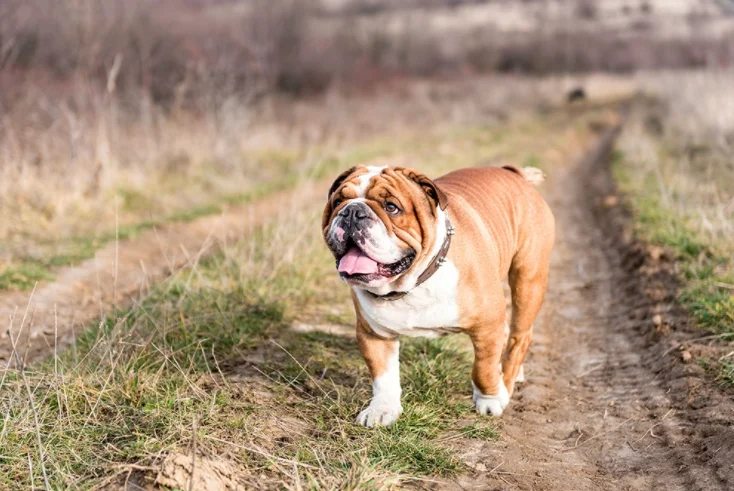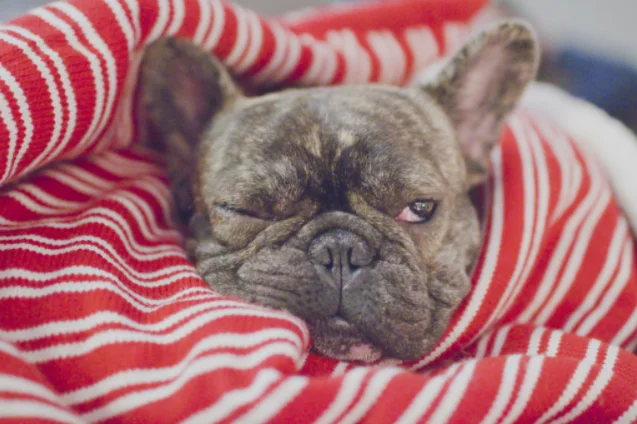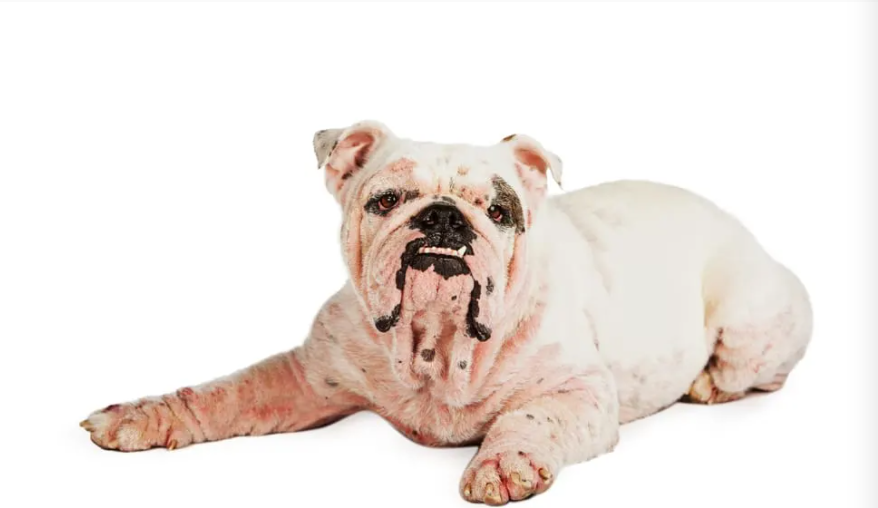Common Bull Dog Allergies ( Causes and Treatments)
Table of Contents
It is significant to provide proper care to a bulldog to ensure to live a long healthy life. This involves being aware and managing their allergies, which can be severe in some bulldogs. All dogs can develop allergies, but Bulldogs are breeds that are a little more prone to them. we will discuss common bull dog allergies so keep reading.
Allergies may be a stressful problem for both the owner, who frequently feels helpless and the dog, who constantly itches until his skin becomes red and raw. It’s much easier to avoid allergic reactions than treating them, so pay attention to allergies.
They’re all avoidable and treatable, so don’t worry. In this article, I will completely guide bulldog allergies, their causes, and proper treatment.
What are bulldog allergies?
An allergy is an immune system over-reacts to a specific substance called an allergen. Protein allergens generally trigger allergic reactions.
“The biological response to allergies can be damaging to the dog’s overall body function.”
Exposure to an allergen over months or years sensitizes the immune system, causing an over-reaction. The immune system usually defends the dog from infectious disease, but allergies damage the immunological response. Allergies are misdirected immunological responses to a harmless foreign substance.
When an allergen and antibody react with mast cells, histamines are released, causing local inflammation, redness, swelling, and itching. This inflammation creates the symptoms of an allergic reaction.
Why is Bulldog prone to allergies?
Some bulldog breeds, such as the Bulldog, Shar-Pei, Boxer, West Highland White Terrier, and Labrador Retriever, are more prone to allergies than others. This indicates they have a genetic susceptibility to allergies and are more prone to disease than other breeds.
A genetic tendency is inherited from their parents’ genetics. If your Bulldog has allergies, it’s possible that one of the pet parents or grandparents had allergies and passed these some of the puppies.
So, it is essential to properly examine any potential Bulldog puppy’s parents and medical history. It’s also good to avoid breeding dogs with allergies, as the infection is easily passed down to the puppies!

Types of Allergies in Bulldogs
The following are some various kinds of allergies in bulldogs:
1. Skin Allergies
Allergic dermatitis is the most common allergic reaction in dogs. Skin allergies in dogs have three primary causes:
- Flea dermatitis
- Food Allergies
- Environmental Allergies
Flea allergy dermatitis is a flea allergy. Some dogs respond to insect saliva. The infected dogs’ skin becomes red, swollen, and scabbed, and it becomes exceedingly itchy. You may also see flea filth or perhaps the fleas themselves.
All skin allergies cause secondary infection. Scratching, biting, and licking your dog’s skin exposes it to yeast and bacterial illnesses that may require treatment.
2. Food Allergies
According to Dr. Jerry Klein, Chief Veterinary Officer, food allergies aren’t as frequent as people think. Symptoms of food allergies include:
- Skin disorders (hives, face swelling, itching).
- Gastrointestinal indicators (vomiting /or diarrhea).
- A mix of both.
Most people imply their dog has a food sensitivity, also called food intolerance when they claim their dog has a food allergy. To distinguish them from real allergies, food sensitivities are a progressive reaction to an offending item in your dog’s food, such as beef or chicken.
Food sensitivities can cause gastrointestinal issues like vomiting and diarrhea or dermatological issues like itching, dry skin, and persistent ear or foot infections.
Look for foods that contain lamb or bison to avoid allergies. Bulldogs need to eat food that is specially formulated for that breed dogs. It’s not only about the diet, but the quality source of diet also matters.
Unlabeled additives in low-grade food might be harmful to your Bulldog’s health. Hence, giving your pet the correct diet usually takes care of any adverse reactions.
3. Contact Allergies
Contact allergies are typically difficult to detect. It’s because they develop when your Bulldog interacts with something allergic. Contact allergies are caused by a variety of factors, including:
- Flea collars
- some plants and grass
- wood in the bedding
- Some types of shampoos.
It’s crucial to note that you shouldn’t presume your Bulldog has a contact allergy. Before jumping to any conclusions, be sure your dog isn’t allergic to any foods or has fleas or other parasites. Following are some preventive measures to deal with contact allergies.
- When wash beddings, use detergents that are free of fragrances and dyes.
- For eating and drinking, only use stainless steel or ceramic bowls, and clean them frequently.
- Avoid using full-strength cleansers in spots where your Bulldog will constantly be sitting.
- When traveling into environments where your Bulldog is allergic, such as grass, wipe down your paws.
How to Diagnose Bulldog Allergy?
Allergies cause a variety of symptoms, including diarrhea and coughing. Scratching, on the other hand, is the most prevalent sign that your Bulldog has an allergy. However, it was not just any scratching; it’s frequently constant and persistent. You’re dealing with a bulldog allergic reaction if you detect this.
When your Bulldog is allergic to these allergens, watch for the following symptoms:
- Paws licking and biting
- Rubbing face with carpet
- Coughing, vomiting, and diarrhea
- flatulence
- sneezing
- seizures
- gagging
- Itchy skin
- Inflammation of the ears
How do you detect the cause of Allergy in Bulldog?
Allergic reactions may be difficult to diagnose, but the following steps assist you in detecting the root cause of allergies.
- If your dog has signs of another illness, your Vet may first rule out that possibility. An allergy test may be recommended if your veterinarian suspects Allergy is the likely cause. Please remember that testing may not always reveal the source of an allergy.
- Elimination diets are often used to identify food sensitivities. Adding a novel source of protein and carbohydrate each day for 12 weeks food trial is also helpful in diagnoses specific food element that causes an allergy in dogs.
- Flea allergy in dogs is the most common source of Allergy in dogs. An easy way to diagnose is to look for fleas on your dog and treat them with an insecticide that kills them before they can bite.

How to treat bulldog Allergies?
Treatment options for allergies should be discussed with your veterinarian. Don’t give any medicine to your Bulldog without the consent of your vet doc. Following are some common treatments to handle bulldog allergies.
Antibiotics
Veterinarians often give antibiotics. Antibiotics are great, but most times it destroys both GOOD and BAD bacteria in the dog’s body. Probiotics should be given with antibiotics to help to restore healthy bacteria. To get daily probiotics, give plain yogurt with every meal to your dog.
Steroids
Use steroids only as a last resort. They call it an “Allergy Shot.” It’s essential to
understand what this miraculous injection contains. Ask! Long-term use of lower dosages of steroid tablets is typical, but you should discuss the consequences of giving steroids to your Bulldog with your doctor.
Allergy tests
Thus allergy tests aren’t 100% reliable and may generate false positives or negatives, so many veterinarians don’t want to perform them. The accuracy depends on the examination. In my view, knowing anything is better than knowing nothing.
Even if some of your test results aren’t ideal, they’ll offer you an idea of which allergens are affecting your Bulldog. Testing normally comes with a scale indicating which are ‘borderline’ and which are severe.’
Also, if you have allergy testing done before they are a year old, you should get another test done a year later. It takes a year for your dog to build antibodies against allergens, and they must be exposed to allergens from all four seasons.
Allergy Injections
An allergy injection may be made specifically for your dog based on the results of your allergy test. You’re attempting to develop immunity in your dog to what they’re allergic to, but this takes time and may take a year to see the benefits. This is not a miraculous cure, but it may provide some relief to your dog.
Blood Tests
The blood test is the cheapest but less accurate. As previously mentioned, I believe it is worth every penny, but if your Bulldog suffers from severe allergies, it gives you an idea about the allergic type.
Cyclosporine/Atopica Treatment
This is the last resort for allergy therapy. This medication is given to many dogs in severe allergy conditions.
Natural Remedies
There are numerous natural allergy remedies available. Veterinarians don’t sell or advertise them. Try “Yucca Intensive,” that is. is a superb, safe, natural supplement for the joints, skin, and digestion. Yucca is a refined extract from the Yucca plant that is believed to relieve symptoms like steroids but without the negative effect.
Allergy Medicines
In addition to Benadryl, there are many daily allergy medicines. Claritin, Zyrtec, and others. Antihistamines function differently on various pets, so you may need to test a couple on your Bulldog.
Prescription diets
Prescription diets may also assist your dog in certain conditions. But these diets are full of harmful components and sometimes affect your pet’s health in the long term perspective.
Hypoallergenic dog food
There are numerous high-quality diets produced by reputable manufacturers with high-quality ingredients. You may either give raw or prepare at-home food to prevent food allergies in bulldogs.
How bulldog owners prevent allergies in the Bulldog
- Many shampoos may itch Bulldogs! Choose a shampoo that cleans and softens the coat while also treating the skin and removing germs and fungus.Antibacterial/antifungal shampoos are widely available in the market.
- Probiotics also help to produce good bacteria in your Bulldog’s gut. You may feed your bulldog probiotic pills, vitamins, or plain yogurt every day to boost its immune function.
- Try a restricted ingredient meal if your Bulldog has allergies. Chicken causes a protein allergy in Bulldogs. But many Bulldogs can eat chicken without any problem. If your Bulldog can eat chicken, let them because It is typically cheaper per pound. Omit chicken only if your dog has an allergic response to a dog meal that includes chicken.
- Both English and French bulldogs need frequent exercise and walk to stay fit. Because bulldogs may weigh up to 50 pounds, don’t let them in the water without a doggy life jacket.
Frequently Asked Questions
1. What is the best approach to handling bulldog allergies?
All types of allergies mentioned above have treatments. But, prevention is always better than cure. Listed above are the techniques used to treat these different types of allergies in bulldogs.
2. What is an Anaphylactic Reaction in Bulldog?
Anaphylactic shock reaction is a severe allergic response that may be dangerous if left untreated. Anaphylactic responses in dogs may be caused by bee stings, vaccination reactions, new diets, or medicines.
3. How to take care of a bulldog coat to prevent skin allergies?
The cheeks and throats of bulldogs have loose skin. To prevent germs from accumulating on their faces, wash them down with dog-friendly wipes regularly; however, avoid contact with the eyes. They should also be brushed a minimum of one time a week to eliminate any dust or other environmental irritants from their coat, such as grass.
Conclusion
While bulldogs have numerous allergies, many would be easily avoided. Always give your Bulldog the finest quality bulldog food. Clean and dust the coat of your Bulldog regularly. That’s enough for keeping your Bulldog allergy-free and healthy.
They will appreciate you for it, and you will save yourself a lot of grief. Skin problems aren’t simple to treat in bulldogs, so keep allergens away.
Please note that Bulldog allergies differ from dog to dog. What suits one owner sometimes may not suit another dog owner. I’m simply sharing the tips and treatments that I have learned over the years of research to help you discover the perfect treatment for your Bulldog.
References:
- https://vcahospitals.com/know-your-pet/allergy-general-in-dogs
- https://anybulldog.com/can-bulldogs-catch-a-cold/
- http://www.englishbulldognews.com/content.php?579-English-Bulldog-Allergies-Information-Treatment-and-Prevention
- 1xbet официального Сайт Казино Игровыми Автоматами 1хбет - April 17, 2024
- Бездепозитные Бонусы За Регистрацию и Онлайн Казино 202 - April 9, 2024
- Yeni Deneme Bonusu Veren On Line Casino Siteler - January 31, 2024








